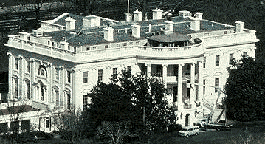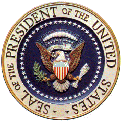
Open-Note Presidential Quiz

 |
Open-Note Presidential Quiz |
 |
|
Use your notes to identify the president being described. 1) He told Europe to stay out of Western Hemisphere's affairs with the Monroe Doctrine in 1823. Answer: James Monroe 2) The first Republican president elected to the Presidency,
he held the Union together through the Civil War. 3) He was the second president to be impeached, but he was found not guilty by the Senate on charges of obstruction of justice. Answer: Bill Clinton 4) Called the "minority president," he won the presidency in 1876 with fewer than fifty percent of the nation's popular vote. With one vote in the Electoral College to spare, he was also elected by special House commission by one vote. Answer: Rutherford B. Hayes 5) He was vice president under Eisenhower, but lost in a close election to John Kennedy. Later he would be forced to resign due to the Watergate scandal in 1974. Answer: Richard Nixon 6) He was president when the Berlin Wall came down, ending Communist rule in eastern Europe. He also fought Saddam Hussein in the Gulf War's Desert Storm defense of Kuwait. Answer: George Bush 7) Even though he was a great Union general during the Civil War, his presidency was one of America's most corrupt administrations. He also was president during the Indian Wars that led to the destruction of many Indian nations in the American West during the late 1860s and early 1870s. Answer: U.S. Grant 8) He is often called the "Father of the Constitution" because he penned the actual document. He also went to war against the British in 1812 over the impressment issue, and he saw the White House set ablaze during that war. Answer: James Madison 9) It was during his presidency that America bought Alaska from Russia. His enemies in the House of Representatives were able to impeach him for violating the Tenure of Office Act of 1867. Answer: Andrew Johnson 10) He is credited with having built the Democratic Party out of the Democratic-Republicans of Thomas Jefferson. he was also a rabid Indian-hater, and it was his administration that drove many eastern Indian tribes into exile in Oklahoma along the "Tail of Tears" in the 1830s. Answer: Andrew Jackson 11) He was elected twice to the Presidency, the only Democratic president during the last half of the 19th century. But his terms were not consecutive. He also was responsible for the annexation of Hawaii and dealt with labor unrest during his terms. Answer: Grover Cleveland 12) His presidency promised a "square deal" for all Americans. Considered a "progressive," he signed legislation that placed regulations on child labor and meat inspection. he also lost a third bid for the presidency in 1912 when he formed a third party called the progressive "Bull Moose Party." Answer: Theodore Roosevelt 13) He disliked political parties, but many historians agree that he was a Federalist. He worked in America's earliest capitals, Philadelphia and New York. Since he had no one to follow, he is often called "the president without precedent." Answer: George Washington 14) He is considered one of America's worst presidents because of high inflation and the Iran Hostage crisis, but he is also seen as one of America's best former presidents with his work for Habitat For Humanity and peacemaking throughout the world. Answer: Jimmy Carter 15) He was America's foremost "Cold Warrior" as he developed the Strategic Defense Initiative (SDI), a defensive weapon that was supposed to destroy Soviet missiles before hitting the US. He also proposed a "New Federalism" that would reduce federal spending and create a smaller, leaner government. Answer: Ronald Reagan 16) He was the Commander-In-Chief of all American forces in Europe during World War II. then he warned against the power of the "military-industrial complex" that developed during the Cold War of the 1950s. Answer: Dwight D. Eisenhower 17) His presidency lasted about 1000 days, but he stood up to the USSR during the Cuban Missile Crisis. Afterwards, they agreed to ban nuclear testing in the air. Answer: John F. Kennedy 18) He hoped for a "Great Society, during the 1960s" so he helped Congress pass the Civil Rights and Voting Rights Acts, as well as Medicare. But he refused to seek a second term under the pressure of the Vietnam War. Answer: Lyndon B. Johnson 19) More known for his writings against Great Britain, he doubled America's size by purchasing the Louisiana Territory from France's Napoleon in 1803. he died on July 4, 1826, just before his friend John Adams. Answer: Thomas Jefferson 20) He led America through the Great Depression and World War II. Many see him as America's greatest Democratic president, and possibly the best president of the 20th century. Answer: Franklin D. Roosevelt
|
|
To The Lesson Plan of the Day Main Page |
To US Government Lessons |